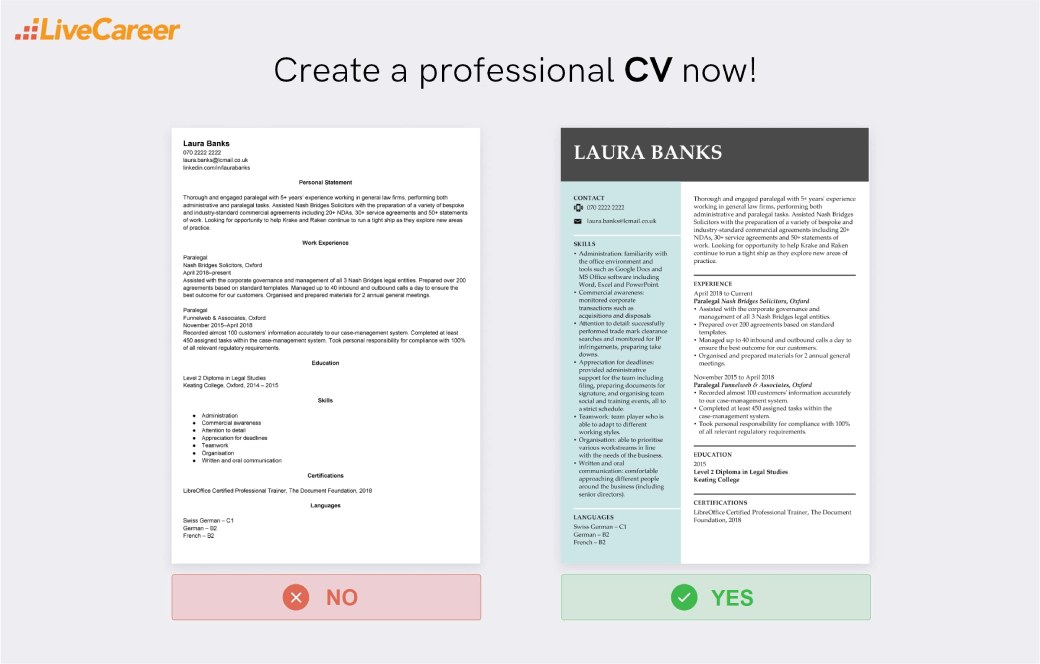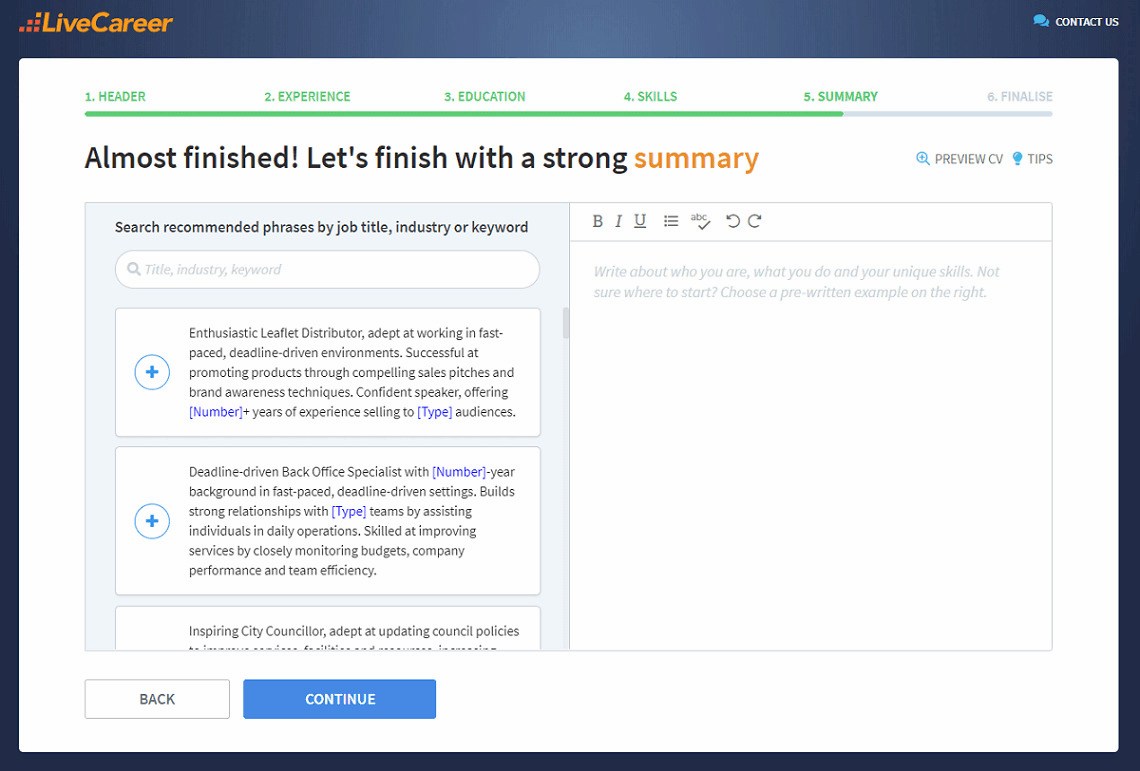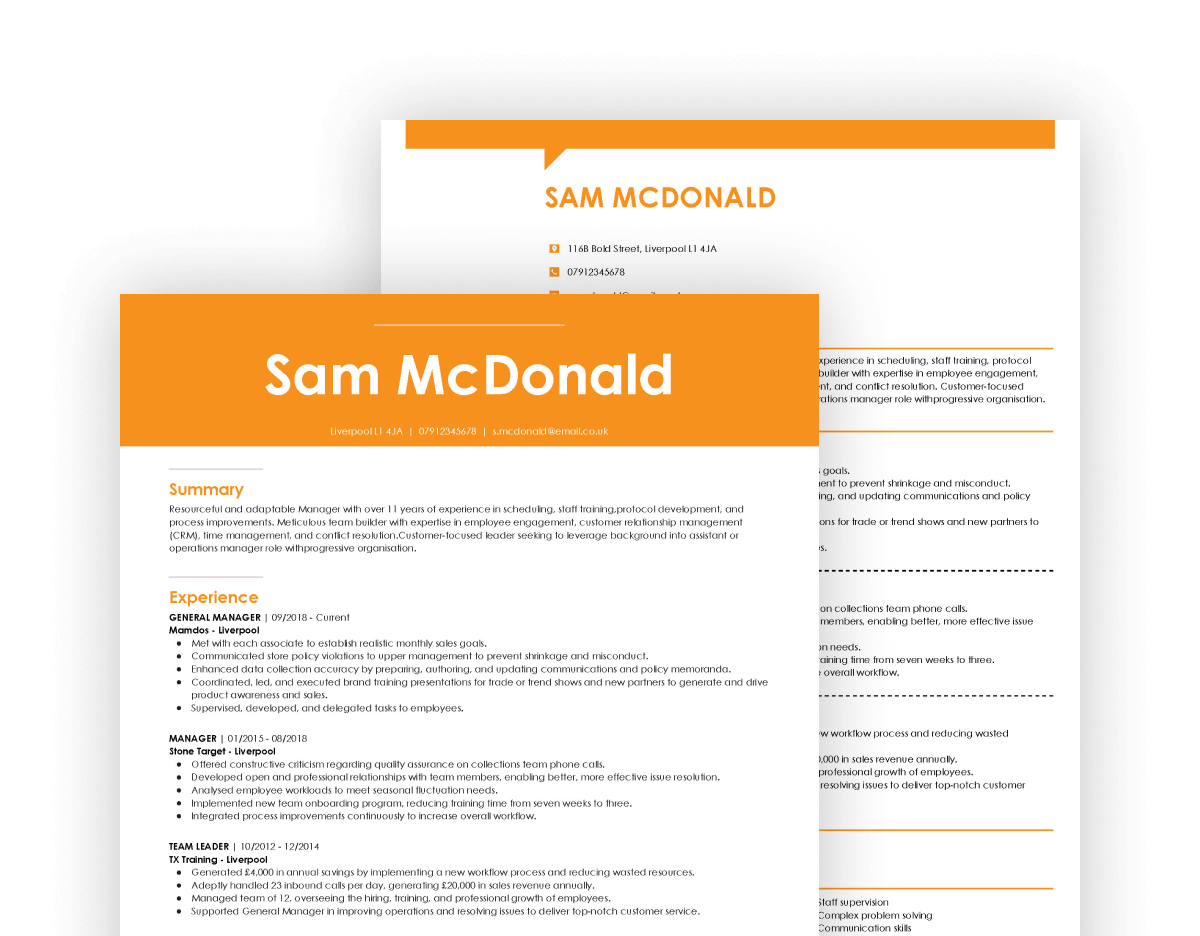Administrator/Admin CV Examples, Template & Tips
See the job-winning admin CV examples for the UK job market. Learn how to write an office administrator CV that shows you manage all the paperwork.
Our customers were hired by:
It can seem like there are a fair few paralegal jobs on offer out there at any given moment. At least, until you start digging deeper and looking for a paralegal job. It then turns out that what a paralegal does differs from company to company.
Some require a law degree, others don’t require legal qualifications at all. Some are heavy on administrative and secretarial duties whereas others have you very nearly doing the work of a solicitor. Once you filter out the unsuitable jobs, there’s not much left. And you’ll need an exceptional paralegal CV if you’re to get interviews at your chosen firms.
This guide will show you a paralegal CV example plus detailed instructions on how to write one for yourself. You'll also get tips and tricks to make your paralegal CV illegally good. Ready?
Create an effective CV in minutes. Choose a professional CV template and fill in every section of your CV in a flash using ready-made content and expert tips.

We created the sample on the right using our builder. See other good CV examples like this one.
Looking for a different CV? See:
Haven't found your job? Check our full list of professional CV examples.
Based on over 6 million CVs created in our builder, we found out that*:
*The data comes from a period of the last 12 months (August 2023-August 2024).
Laura Banks
070 2222 2222
laura.banks@lcmail.co.uk
linkedin.com/in/laurabanks
Personal Statement
Thorough and engaged paralegal with 5+ years’ experience working in general law firms, performing both administrative and paralegal tasks. Assisted Nash Bridges Solicitors with the preparation of a variety of bespoke and industry-standard commercial agreements including 20+ NDAs, 30+ service agreements and 50+ statements of work. Looking for opportunity to help Krake and Raken continue to run a tight ship as they explore new areas of practice.
Work Experience
Paralegal
Nash Bridges Solicitors, Oxford
April 2018–present
Paralegal
Funnelweb & Associates, Oxford
November 2015–April 2018
Education
Level 2 Diploma in Legal Studies
Keating College, Oxford, 2014 – 2015
Skills
Certifications
LibreOffice Certified Professional Trainer, The Document Foundation, 2018
Languages
Swiss German – C1
German – B2
French – B2
Now you know what a CV looks like. Here’s how to write your CV, and specifically, the paralegal CV:
The pop-culture image of legal work involves a lot of impassioned, persuasive arguments delivered to stirring orchestral scores. The reality is, of course, somewhat lacking in musical score, to say the least. The thing is, you need your CV personal statement (personal profile) to grab recruiters’ attention and hold it.
The good news is that the David E. Kelley approach isn’t even the most effective one here. Your personal statement needs to do just three things. It has to introduce you as a paralegal, show what exactly it is that you can offer your new employer, and make a case for your goals being in line with the firm’s/company’s.
To introduce yourself, start with how many years’ experience you have working as a paralegal (or in a related position). State where you gained that experience (i.e. what industries and legal specialisations). To give an indication of what you can bring to this employer, describe what you’ve brought to previous employers.
Do this by pointing to a particular achievement. An achievement, in this context, is the description of an action you took at work and the benefits that fell to your employer as a result of this action. Start with a dynamic verb and be sure to quantify as much as you can, the benefit to your employer if nothing else.
All that’s left to do is explain how your goals line up with the firm’s or company’s goals. There’s an extremely effective shortcut to doing this well: simply state what it is that you hope to be able to achieve for the employer in your new role, should you get it. This will automatically show an alignment of goals.
There’s a lot happening in a personal statement, but it can’t get too wordy or no one will want to read it and the whole exercise becomes counterproductive. Limit yourself to 3–4 sentences and 50–150 words. The fewer words, the better: so aim for 50 words rather than trying to barely duck under 150 words.
Your paralegal CV is likely to be parsed by an Applicant Tracking System (ATS) before it even comes to the attention of a recruiter. Sidestep ATS gatekeeper algorithms by mentioning the name of the company/firm and the job title (for which you’re applying) exactly how it’s given in the job advert.
Your personal statement may well come first in your paralegal CV, but it’ll be much better if you write it last (and that’s why it’s often called a CV summary). You’ll have far more resources at your disposal after you’ve written your work experience and skills sections. So keep it at the back of your mind for now and come back to it later.
Thorough and engaged paralegal with 5+ years’ experience working in general law firms, performing both administrative and paralegal tasks. Assisted Nash Bridges Solicitors with the preparation of a variety of bespoke and industry-standard commercial agreements including 20+ NDAs, 30+ service agreements and 50+ statements of work. Looking for opportunity to help Krake and Raken continue to run a tight ship as they explore new areas of practice.
A strong CV summary will convince the recruiter you’re the perfect candidate. Save time and choose a ready-made personal statement written by career experts and adjust it to your needs in the LiveCareer CV builder.

The idea of a career in law is one thing. Amassed theoretical knowledge is one thing. Working in a solicitors’ office or corporate environment as a paralegal is something else entirely. Education and transferable skills are important, but experience is a surer indicator of success in many employers’ eyes.
Make sure your CV work experience section wows recruiters and smashes through ATS hurdles. Go with a chronological CV format. It’s what recruiters expect to see and what ATSs are set up to parse most easily. List your paralegal job descriptions in reverse-chronological order.
Generate a subheading for each of your previous paralegal and related roles using this paralegal CV template:
[Job Title]
[Company Name, Location]
[Dates of Employment]
Populate each job description thus created with up to six bullet points. Each bullet point will be an achievement from the given job, just like the one you wrote in your personal statement. Remember to quantify the benefits and anything else possible. Estimate where needed, but keep it realistic.
If you’re writing a paralegal CV with no experience, then focus on any internships, placement work, and volunteer work you’ve done—these all count here. Otherwise, consider writing a student CV or graduate CV instead. It’ll be better suited to your needs and will give you a better chance at landing an interview.
Paralegal
Nash Bridges Solicitors, Oxford
April 2018–present
Paralegal
Funnelweb & Associates, Oxford
November 2015–April 2018
It’s a common misconception that you need a law degree to be a paralegal. That’s just one of several ways to get into this line of work. Whatever path you’ve taken and wherever you’re headed, make sure your education section is up to snuff without any of the padding that just wastes precious space.
Follow these guidelines and don’t add anything that doesn’t appear in the paralegal CV templates below. Short and sweet is the name of the game here. List your qualifications in reverse-chronological order. Use the following template for both university degrees and other tertiary qualifications:
[Degree Type] [Degree Name](Degree Class), [Years Attended]
[Institution Name], [Institution Location]
Include an expected graduation date if you’re still finishing up a qualification. There’s no need to include your high-school education once you have a tertiary qualification and a few years of experience behind you. Use the following templates to detail your high-school education:
A-levels: [Subject Name 1], [Subject Name 2], [Subject Name 3]
[School Name], [School Location], [Years Attended]
[number of GCSEs completed] GCSEs (including Mathematics and English)
[School Name], [School Location], [Years Attended]
Don’t mention any grades or subjects (other than A-levels) by name. You can include bullet points here to highlight your achievements, extracurricular activities or areas of excellence while studying if you lack work experience. You can also place this section above your work experience section in such cases.
Level 2 Diploma in Legal Studies
Keating College, Oxford, 2014 – 2015
It’s totally uncontroversial to state that lists of skills will never have the same effect as actually seeing those skills in action. Most CVs are filled with impressive-sounding skills and with no checks and balances, anyone can claim virtually anything they want. Recruiters know this, of course, and tune out a little.
You’re going to do something different. Every skill you list will carry with it ‘proof’ that you actually possess it. Given that you’ll need to write a new skills section every time you prepare a new job application, it’s going to be far more efficient if you first prepare a master file from which you can then simply copy.
Open a new document file and list all the paralegal CV skills you can think of (hard and soft skills). Once you’ve run out of steam, go back to the beginning and add a sentence to each skill in which you outline how you’ve demonstrated that skill at work. Any skill for which you can’t do this doesn’t make the cut.
Save your new paralegal skills master list. Go back to the job advert to which you’re responding and highlight the skills they’re after. Simply copy and paste 5–10 skills from your master list into your CV. Be sure to at least cover the required skills and aim for a mix of hard, soft, and IT skills.
People from all kinds of backgrounds who are on all kinds of trajectories become paralegals. A lot of that diversity is lost when looking only at recent work experience, education, and skills, though. Stand out from the crowd and paint a more detailed portrait of yourself as a paralegal by adding extra sections to your CV.
Augment your CV with sections that list your non-academic qualifications, awards you’ve won, accolades you’ve received, even your hobbies and personal interests are fair game. There’s just one constraint here: everything you add has to be directly and demonstrably relevant to the job to which you’re applying.
There’s one apparent exception to this rule, though: the ability to speak a foreign language is always relevant, even if you don’t anticipate having the opportunity to use it in your day-to-day work. The benefits of speaking languages other than English go beyond this kind of immediate utility.
Certifications
LibreOffice Certified Professional Trainer, The Document Foundation, 2018
Languages
Swiss German – C1
German – B2
French – B2
*Unless specifically asked not to, of course. Your job application is by default composed of two main parts: your paralegal CV and a paralegal cover letter. You know how incomplete paperwork is treated in the legal profession (the words ‘null and void’ are often invoked), it’s the same in the job-hunting game.
Like many standard legal documents, there’s a template for this and it’s called the standard UK business cover letter format. You’re probably all too familiar with it; it’ll govern how you start and end your paralegal cover letter. The body paragraphs of your cover letter are where the magic will happen, though.
Start your cover letter with attention-grabbing opening paragraph in which you introduce yourself and straight away show what you have to offer the company. Then it's time for a quick-fire showcase of your prior achievements and a concise cover letter wrap-up followed by a confident call to action. That is how your cover letter gets your CV in the right pile.
There’s a reason you check and triple check legal documents for careless mistakes. The consequences of sloppy writing in your CV might not be objectively as high, but they could certainly be devastating on a personal level. Demonstrate your attention to detail by taking care of the little things.
Proofread your CV and cover letter and run spellcheck on it and/or pass it through a trusted app or web app to catch all remaining spelling and grammar mistakes. Get someone to read over your work, they’ll almost always pick up on issues that you missed—we all have blind spots and a second pair of eyes is priceless.
Attend to the overall look and readability of your paralegal CV. Leave your contact details near the top of your CV. Choose a professional-looking CV font like Noto, Garamond, Liberation or Calibri. Lock the font size in at 11–12 points. Use white space and subheadings to clearly break your CV structure down into sections.
Keep the length of your CV down to a single A4 page. Extend this out to two A4 pages only if you have more than two decades of experience. Save or export your perfect CV and cover letter in PDF, going with a less stable format only if explicitly asked to do so. Finally, follow up if you haven’t heard back after a week!
You don’t have to be a CV writing expert. In the LiveCareer CV builder you’ll find ready-made content for every industry and position, which you can then add with a single click.

I hope this article has helped you draft a paralegal CV of which you can be proud and, more importantly, that gets you an interview for your dream job. Do you have any questions or comments? Any job-hunting stories to share? Please drop us a line in the comments section below.
Our editorial team has reviewed this article for compliance with Livecareer’s editorial guidelines. It’s to ensure that our expert advice and recommendations are consistent across all our career guides and align with current CV and cover letter writing standards and trends. We’re trusted by over 10 million job seekers, supporting them on their way to finding their dream job. Each article is preceded by research and scrutiny to ensure our content responds to current market trends and demand.
About the author
Since 2013, the LiveCareer UK team has shared the best advice to help you advance your career. Experts from our UK editorial team have written more than one hundred guides on how to write the perfect CV or cover letter.
Rate this article:
Paralegal cv
Average:

See the job-winning admin CV examples for the UK job market. Learn how to write an office administrator CV that shows you manage all the paperwork.
See a collection of best professional LaTeX CV templates selected by experts. Simple, modern, and creative LaTeX CV templates for academics and more!
Writing a paralegal cover letter can be a high-stress, high-stakes affair. See some great paralegal cover letter examples, tips, and expert advice.
Our customers were hired by: